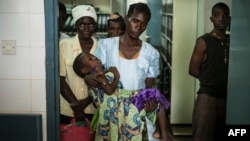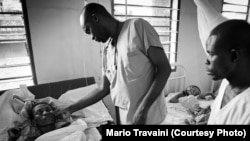The humanitarian aid group Doctors Without Borders says worldwide goals to curb HIV infection by 2020 will not be met unless aid providers recognize and meet the need for more work in West and Central Africa, where the infection rate is low compared to sub-Saharan African nations.
Doctors Without Borders released a report Wednesday saying the focus on Africa's so-called "HIV hotspots" has resulted in a too-narrow focus that overlooks needs in West and Central Africa.
The report says while HIV prevalence in that region is relatively low, with 2.3 percent of the population living with the virus, it is still three times the worldwide rate, and pockets of that region have prevalence rates as high as 5 percent.
The report urges United Nations agencies, European donor agencies, national governments and civil society to fast-track a plan to scale up antiretroviral treatment for countries in West and Central Africa where less than one-third of the population in need is currently getting treatment.
Dr. Eric Goemaere of Doctors Without Borders says the needs in West and Central Africa remain "enormous," with three out of four people in need of HIV care not accessing it. He said that number represents five million out of the 15 million worldwide who should be started on antiretroviral treatment by 2020, if HIV treatment goals are to be met.
The report finds that HIV sufferers in West and Central Africa face obstacles to getting treatment. It says HIV needs in that region are underestimated and given little priority, while those needing treatment face barriers such as stigma, drug shortages, health care fees, and poor quality services. Violence and other disease epidemics can also complicate access to antiretroviral treatment.
The group says the "treatment gap" in the region must be closed "now or never." It says if the world is serious about defeating AIDS it is time to broaden its focus to include the West and Central Africa sufferers that it calls "some of the most neglected victims of HIV/AIDS."






